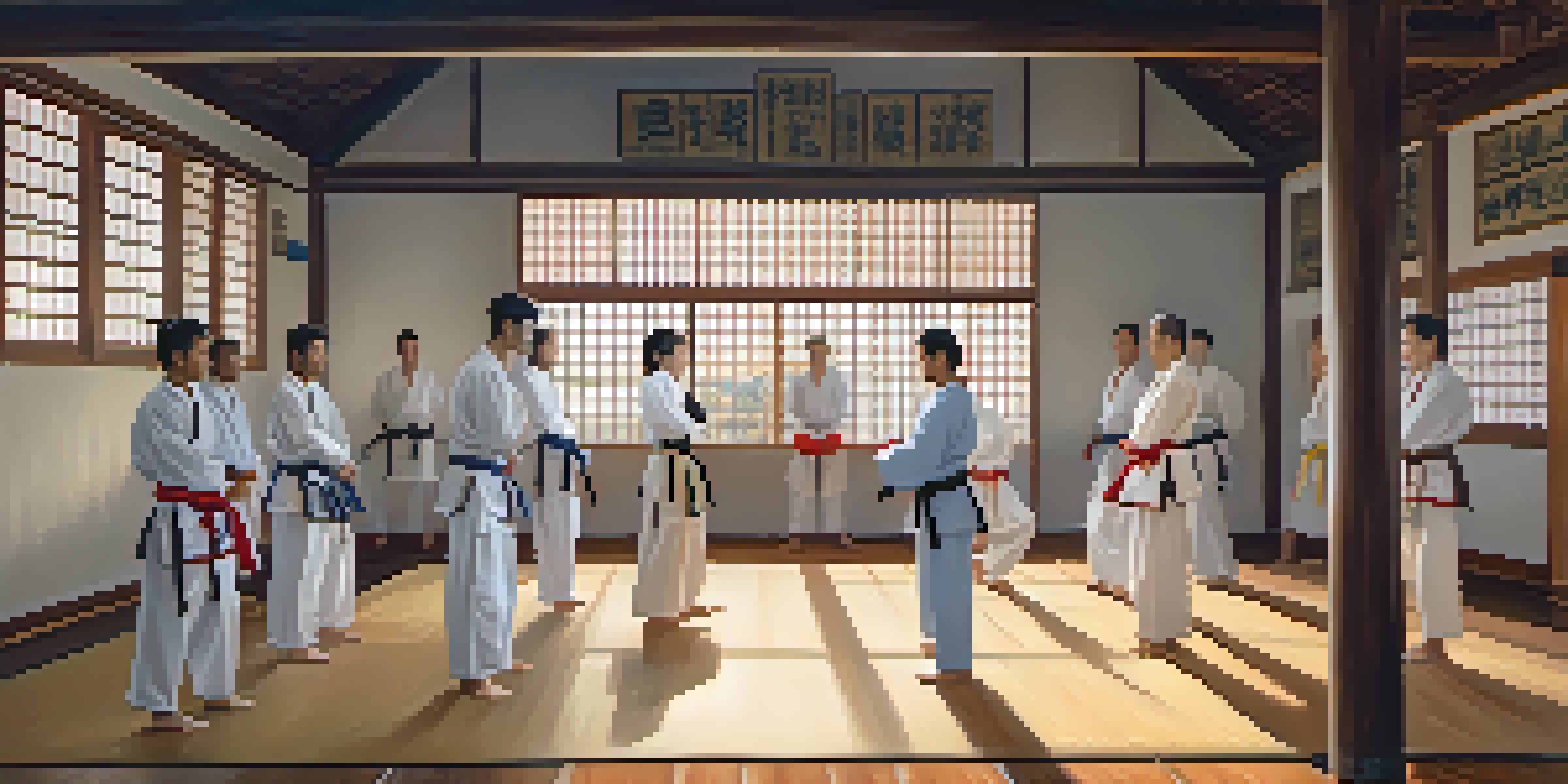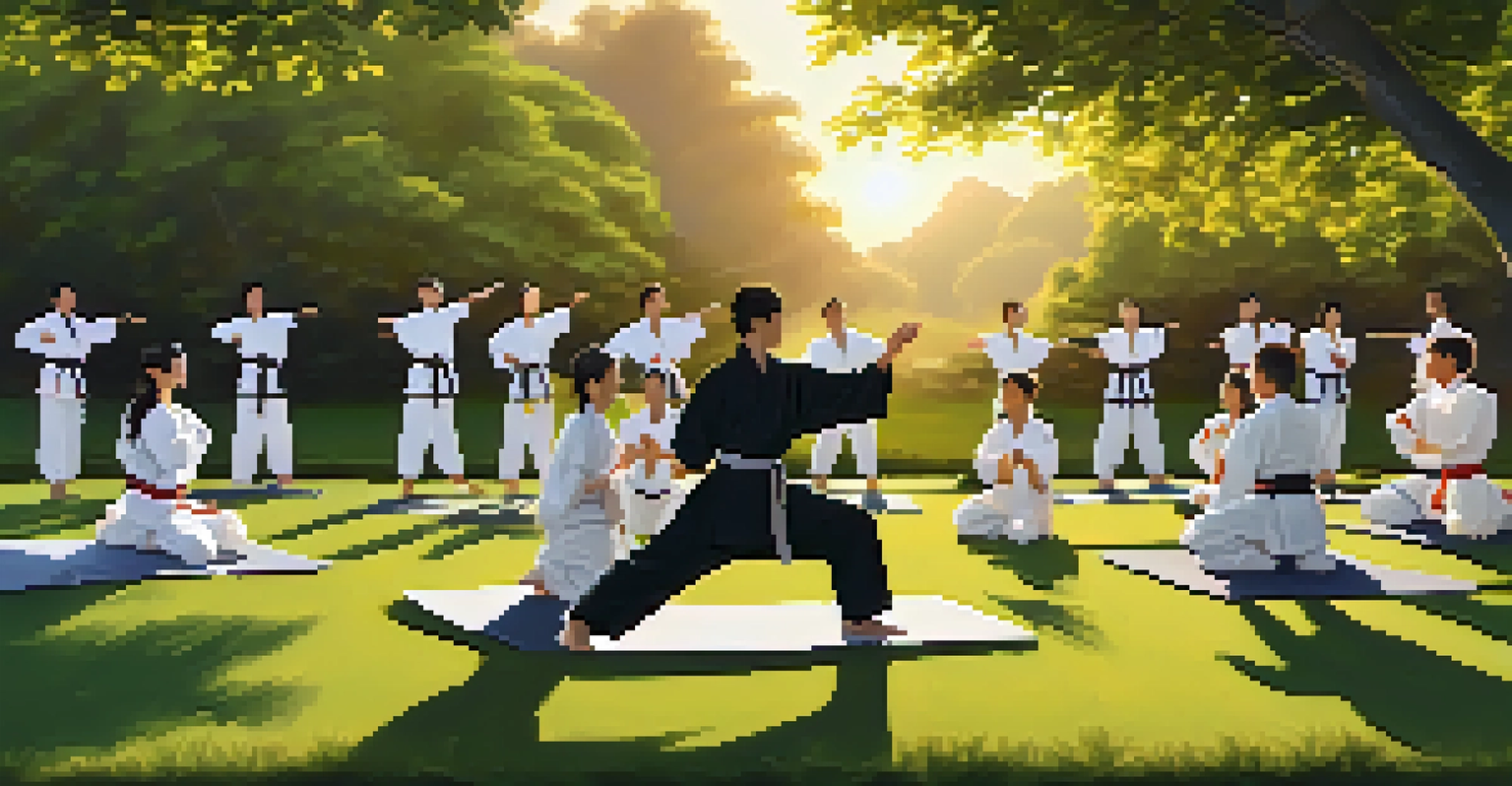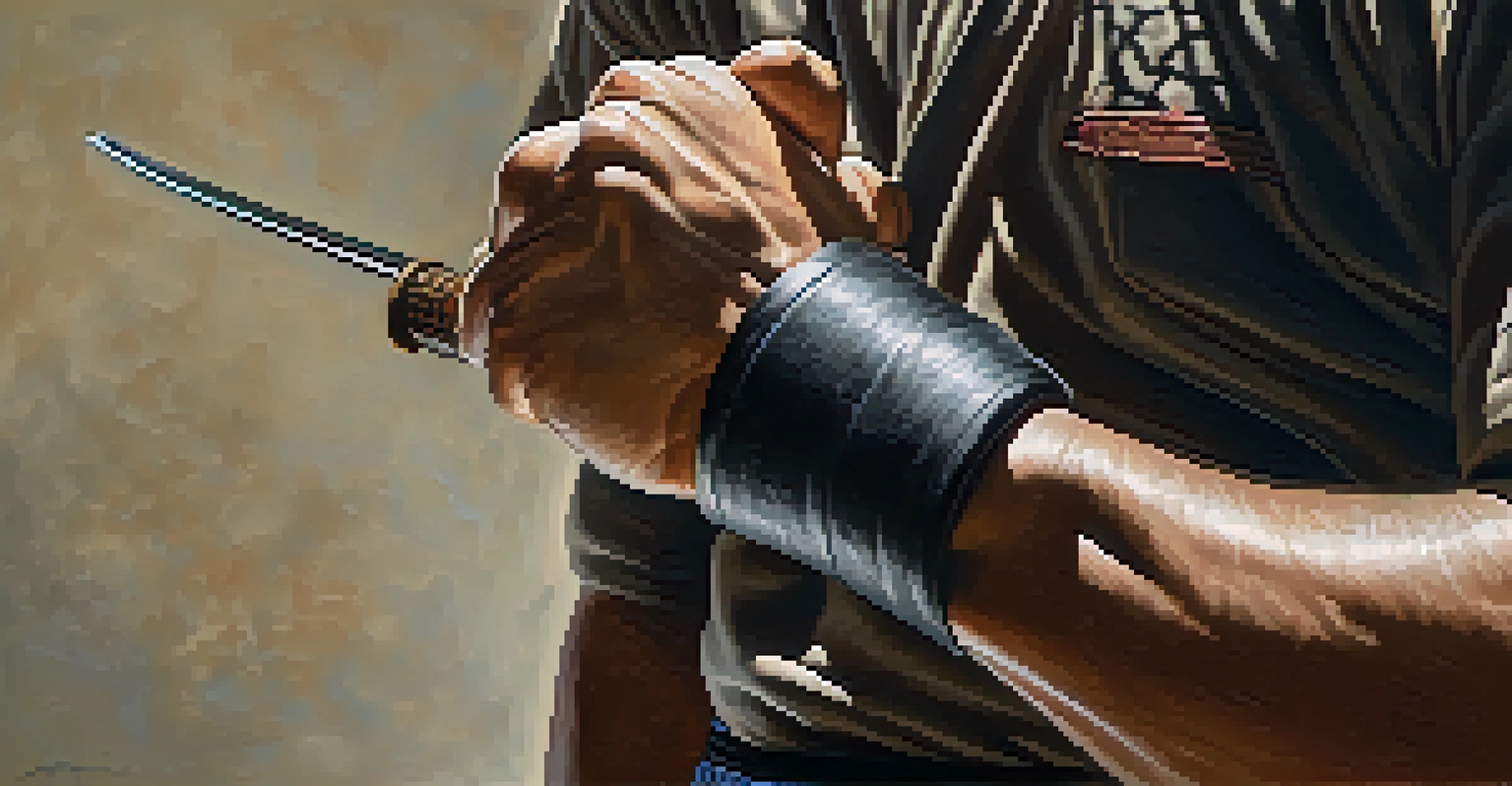The Philosophy of Self Defense in Traditional Martial Arts

Understanding Self-Defense: More than Just Physical Skills
Self-defense in traditional martial arts extends far beyond just learning to throw a punch or a kick. It embodies a philosophy that emphasizes awareness, responsibility, and personal growth. Practitioners learn to assess situations, ensuring that they can respond appropriately, rather than react impulsively.
The ultimate aim of martial arts is not having to use them.
This approach teaches individuals that self-defense is as much about mental preparedness as it is about physical capability. The philosophy encourages self-reflection and the development of a calm mind, which is crucial during high-pressure situations. It’s about cultivating a mindset where one is always aware of their surroundings.
Ultimately, the essence of self-defense lies in understanding the balance between aggression and restraint. In traditional martial arts, this philosophy promotes the idea that the true martial artist seeks to avoid conflict whenever possible, using their skills only as a last resort.
The Role of Discipline in Martial Arts Training
Discipline is a cornerstone of traditional martial arts, shaping the way practitioners approach self-defense. Regular training instills a strong sense of routine and commitment, which translates into everyday life. This discipline is not just about mastering techniques but also about developing character and resilience.

Through rigorous practice, martial artists learn patience and perseverance, essential traits when facing any challenge, whether in a dojo or in real-world scenarios. This disciplined mindset aids in controlling emotions, allowing individuals to respond to threats with clarity and precision.
Self-Defense is Holistic
Self-defense encompasses mental preparedness, awareness, and personal growth, emphasizing a balanced approach to conflict.
Moreover, the discipline learned in martial arts fosters respect—both for oneself and for others. This respect is foundational to the philosophy of self-defense, reinforcing that physical skills should never be misused or taken lightly.
The Importance of Respect and Honor in Martial Arts
Respect and honor are not just cultural aspects of traditional martial arts; they are integral to the philosophy of self-defense. Practicing martial artists are taught to respect their instructors, peers, and even their opponents. This cultural framework creates a supportive environment where individuals can grow and learn from one another.
Self-defense is not just a skill, but a mindset that empowers you to take control of your life.
By fostering respect, martial arts promote a sense of community and mutual understanding. This atmosphere encourages practitioners to value the journey of self-improvement over mere competition. Consequently, the emphasis on honor leads to a deeper appreciation for the art itself, rather than just the combat skills it imparts.
In the context of self-defense, this respect translates into a responsible use of skills. Practitioners understand that their training equips them to protect themselves and others, and that this power comes with the obligation to act honorably.
Mindfulness: A Key Component of Self-Defense
Mindfulness plays a critical role in traditional martial arts, particularly in the context of self-defense. It involves being fully present, aware of one’s surroundings, and attuned to one’s emotions and thoughts. This heightened state of awareness is essential in assessing potential threats and responding appropriately.
Practicing mindfulness allows martial artists to stay calm under pressure, a crucial asset in any self-defense situation. The ability to detach emotionally from a confrontation enables practitioners to make rational decisions rather than succumbing to fear or panic.
Discipline Builds Character
Regular training in martial arts instills discipline, promoting patience, resilience, and emotional control in practitioners.
In essence, mindfulness in martial arts training cultivates a mental toolkit that aids in conflict resolution. It encourages individuals to think critically about their actions, promoting a thoughtful approach to self-defense that prioritizes safety and de-escalation.
Self-Defense as a Means of Empowerment
One of the most profound aspects of the philosophy of self-defense in traditional martial arts is its potential for empowerment. Training provides individuals—especially those who may feel vulnerable or insecure—with the confidence to stand their ground. This empowerment is not solely about physical strength but also about mental fortitude and self-assuredness.
As practitioners progress in their training, they often experience a shift in self-perception. They learn that they are capable of defending themselves and that their worth is not dictated by external circumstances. This newfound confidence can positively impact various aspects of their lives, from personal relationships to professional endeavors.
Furthermore, this sense of empowerment fosters a proactive attitude towards safety. Instead of living in fear, individuals become more assertive in protecting themselves and others, reinforcing the idea that self-defense is a vital life skill.
The Philosophical Roots of Traditional Martial Arts
Traditional martial arts are deeply rooted in philosophical teachings, often drawing from ancient wisdom that guides practitioners in their training. Concepts like balance, harmony, and the yin-yang principle have influenced the way martial artists perceive self-defense. These philosophies encourage a holistic approach, considering the mind, body, and spirit as interconnected.
By exploring these philosophical roots, practitioners can gain a deeper understanding of their martial art's purpose. It's not just about physical prowess; it's about embodying the principles that promote peace, respect, and responsibility. This broader perspective enriches the practice and enhances the self-defense philosophy.
Community Enhances Learning
The supportive environment of martial arts fosters camaraderie, allowing practitioners to grow together and learn from one another.
Incorporating these philosophical teachings into training helps individuals cultivate a well-rounded character. This understanding fosters a sense of humility and gratitude, reminding practitioners that self-defense is a privilege, not merely a skill.
The Role of Community in Martial Arts Training
Community plays a vital role in the philosophy of self-defense within traditional martial arts. Training environments foster camaraderie and support among practitioners, creating a sense of belonging. This community aspect encourages individuals to share their experiences, learn from one another, and grow together in their self-defense journey.
Through partner drills and sparring sessions, martial artists forge bonds that often extend beyond the dojo. These relationships contribute to personal growth, as practitioners hold each other accountable and celebrate each other's successes. The shared commitment to learning and improvement cultivates a strong network of support.

Moreover, the community aspect reinforces the philosophy that martial arts is not just about individual success but about lifting each other up. Practitioners learn that by helping others, they enhance their own skills and understanding of self-defense.